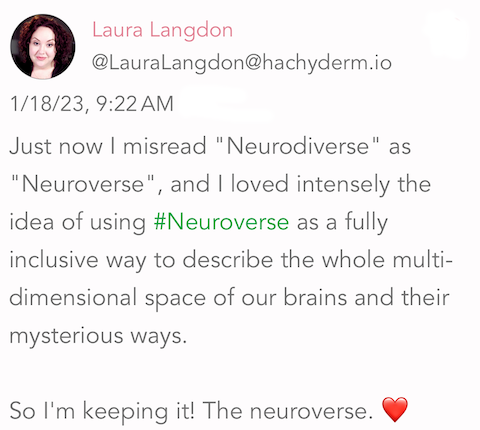A few months ago, I saw the word "neurodiverse" and misread it as "neuroverse", which struck me as an incredibly lovely way to consider what we usually pose as a juxtaposition between the "neurotypical" and "neurodivergent":

That juxtapositional framing is harmful, though, and—as I'll argue here—fundamentally invalid.
The term "neurotypical" implies the existence of a statistical central tendency that represents some kind of majority of brains. This doesn't exist in the Neuroverse, however, because the Neuroverse is a multi-dimensional space and is therefore subject to the Curse of Dimensionality, which prevents any meaningful clustering of data points in spaces of greater than two dimensions. And given the countless ways human brains can differ from one another, the Neuroverse is certainly a high-dimensional space!
If we can't meaningfully cluster the data points of the Neuroverse, then there can be no way to identify a central tendency, or what we colloquially refer to as an "average" or "typical" brain. There's no such thing as a "neurotypical brain". What does exist, however, is the idea that there exists a "neurotypical" brain. And this idea is what harms everyone, "neurotypical" and "neurodivergent" alike.
To those who understand that race does not exist except as a social construct this scenario will be intuitive: just as race does not exist but racism most certainly does, the distinction between "neurotypical" and "neurodivergent" does not exist, yet the belief in the distinction permeates the whole of our society and associated infrastructure, to the detriment of us all. Moreover, intersectionality means that people with biological attributes labeled "not white" by society and neurological attributes labeled "not neurotypical" are multiply impacted by discrimination.
The word "spectrum" is also unhelpful, evoking a sense of linearity, like if we could represent it electronically we could turn a knob to scrub through different all possible values of autism, ranging from "not autistic" to "100% autistic", with a diagnostic tipping point in there... somewhere. Diagnosis isn't considered in quite such simple terms, but the linear vibe has deep roots in our collective understanding. And unlike, say, diabetes, there's no blood test to provide an objective assessment of whether a particular brain is autistic. I think it's much more complicated than that, and much more like The Doctor's attempt to explain the true nature of time:
People assume that time is a strict progression of cause to effect, but actually, from a non-linear non-subjective viewpoint, it's more like a ball of wibbly-wobbly, timey-wimey... stuff.
I think that's the Neuroverse in a nutshell: it's more like a big ball of wibbly-wobbly, brainy-wainey... stuff.






